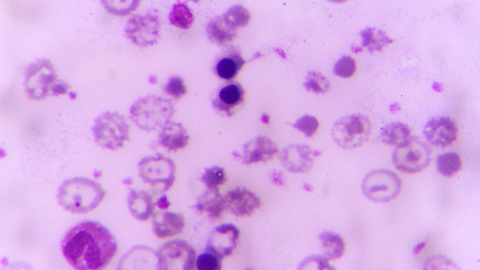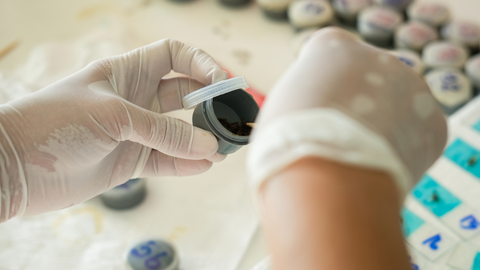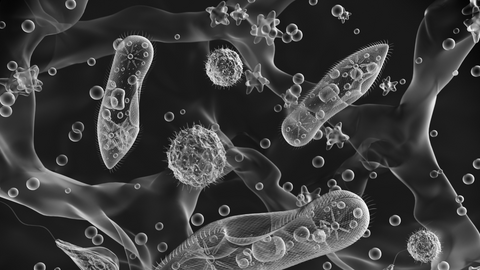What is Blastocystis Hominis? Exploring Symptoms, Diagnosis and Treatment
March 06, 2024
Blastocystis hominis is a single-celled parasite that is commonly found in the intestines of healthy individuals as well as those who suffer from gastrointestinal symptoms. This microscopic organism has long puzzled researchers and healthcare professionals due to its widespread prevalence and the debate over its role in human health. This article aims to demystify Blastocystis hominis, shedding light on its nature, how it affects humans, and the current approaches to treatment.
The Nature of Blastocystis Hominis

Blastocystis hominis belongs to the group of microorganisms known as protozoans, and is known for its complex genetic diversity, with several subtypes identified, some of which are thought to be more closely associated with human disease than others. (1) The relationship between Blastocystis hominis and humans is complex, with its detection in both symptomatic and asymptomatic individuals, complicating the narrative around its role in human health.
What Are The Symptoms of Blastocystis Hominis?
The presence of Blastocystis hominis in the gut is often linked with a range of gastrointestinal symptoms, the scope and impact of which vary greatly from person to person. In some cases, symptoms are so mild that they are hardly noticeable. In other cases, they can be seriously debilitating, and some symptoms can extend beyond the gastrointestinal system. (2)
Some of the symptoms that have been associated with this parasite include:
- Diarrhea
- Abdominal Pain
- Bloating
- Gas
- Constipation
- Nausea
- Fatigue.
- Skin Rash
- Joint Pain
- Muscle Pain.
- Headaches
- Mental Fog
Transmission: How Do You Get Blastocystis Hominis?
Understanding the transmission of Blastocystis hominis is essential for prevention and treatment. The parasite is primarily spread through the fecal-oral route, which includes the consumption of contaminated water or food and contact with contaminated surfaces. Regions with poor sanitation and water treatment are hotspots for Blastocystis transmission, highlighting the importance of clean water access and hygiene practices in controlling the spread of this parasite.
How Is Blastocystis Diagnosed?

Diagnosing a Blastocystis hominis infection involves stool sample analysis under a microscope or more advanced molecular techniques such as PCR to detect the parasite's genetic material. The choice of diagnostic method can influence the detection rate, with molecular techniques offering higher sensitivity. (3) Because the parasite is common and people can carry it without showing any signs of illness, doctors usually decide to test for the parasite only when a patient is experiencing gastrointestinal symptoms.
What Is the Treatment for Blastocystis Hominis Infections?
The treatment of Blastocystis hominis infections is a subject of considerable debate, as there are many cases in which the parasite exists in the gastrointestinal tract without causing any symptoms. However, in symptomatic cases, a tailored approach is often recommended, including antiparasitic medications, probiotics, and dietary adjustments. For all health issues, it is best to approach treatment holistically, addressing critical areas of health like diet, exercise, sleep, and stress levels, as well as directly focusing on the treatment of the issue. It is important that any treatment plan is developed in consultation with a healthcare professional.
Zuma Nutrition's Parasite Detox Tonic is a potent formula containing therapeutic extracts of cloves, wormwood, and green-black walnut hulls – well-researched herbs revered for their antiparasitic properties. This formula may help eliminate a range of parasites in the gastrointestinal tract – including Blastocystis hominis. Be sure to consult with your doctor to see if this supplement is right for you, especially if you are currently taking any prescription medications.
The Controversy Around Blastocystis Hominis

Experts disagree about whether Blastocystis hominis is harmful. Some think it's a harmless germ that normally lives in our guts. Others say it might cause stomach problems and could be dangerous for people with weak immune systems or for those who don't have the right balance of good bacteria in their guts. This argument highlights the need for more research on this microorganism to figure out when Blastocystis hominis can change from being safe to a health risk.
The ongoing research into Blastocystis hominis is vital for better understanding its role in human health. Studies focusing on the parasite's genetics, its interaction with the human host, and the impact of various subtypes on health are essential for developing targeted treatment strategies and public health interventions. Moreover, improving sanitation and access to clean water remains a cornerstone in preventing the spread of Blastocystis hominis and many other infectious diseases, highlighting the interconnectedness of human health and the environment.
What to Do If You Have Been Diagnosed with Blastocystis hominis
For individuals diagnosed with Blastocystis hominis, especially for those experiencing symptoms, lifestyle adjustments and medical management can play a significant role in improving their quality of life. This includes following a holistic treatment regimen, maintaining strict hygiene practices to prevent spread, and dietary modifications to manage symptoms. If you are experiencing symptoms of Blastocystis hominis, ask your doctor about doing a GI test for parasites and other gut pathogens. This can identify whether you do have a Blastocystis hominis infection and will inform your doctor about the next steps for treatment.
Summary
Blastocystis hominis is a protozoan parasite commonly found in the human gastrointestinal tract. In some cases, it is asymptomatic. In others, it is connected to a range of symptoms and health issues. Because of this, there is debate among researchers as to whether it is a harmful parasite or a natural part of the human microbiome. As research progresses, the hope is that a clearer picture will emerge, allowing for better management of Blastocystis hominis infections and a deeper understanding of its role in human health.
References
1 https://www.ncbi.nlm.nih.gov/pmc/articles/PMC172910/
True Health Starts with Feeding the Body



